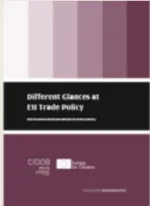EU trade policy in the multilateral trading system

In the context of the Doha Development Round (DDA) trade negotiations,in June 2008 ministers from some 70 WTO member countries met in Geneva in a so-called “mini-ministerial” format to seek an agreement on a set of key elements of a package of results on agricultural and non-agricultural market access (NAMA), among other areas. Ministers and senior officials knew by then what the main features should be of the potential political agreement necessary to enter the final phase of the DDA. To secure a substantial result in agriculture, trade-offs in other areas were required. Developing countries, especially the emerging economies, were in particular called to make concessions on NAMA.After nine days of mini-ministerial meetings, it became clear that an agreement was not possible. This was the last time a serious attempt was made to conclude the DDA. Many point to India and/or the US as bearing the main responsibility for this failure. What is truly remarkable is that even though the main controversy was, as usual, agriculture, the EU was not blamed, unlike in past multilateral rounds of trade negotiations.